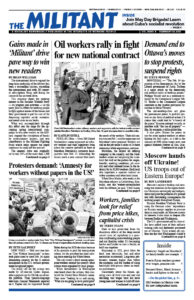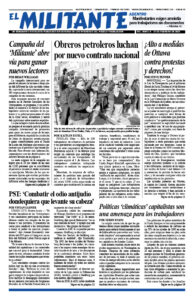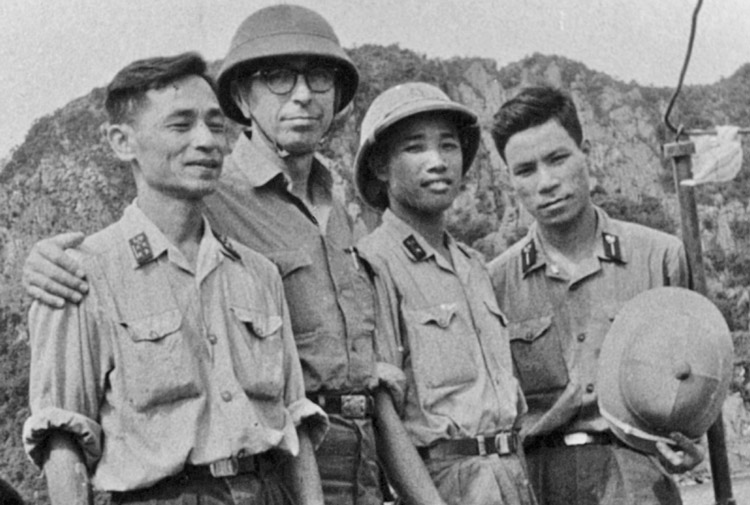The Spanish edition of Making History: Interviews With Four Generals of Cuba’s Revolutionary Armed Forces by José Ramón Fernández, Enrique Carreras, Harry Villegas and Néstor López Cuba is one of Pathfinder’s Books of the Month for February. Division Gen. Carreras was an air force officer who had trained in the U.S. during the Second World War. He opposed the U.S.-backed coup by Fulgencio Batista in 1952 and joined the revolutionary movement led by Fidel Castro. During the April 1961 Bay of Pigs mercenary attack against the socialist revolution in Cuba, Carreras led the revolution’s fledgling air force, which played a decisive role in defeating the U.S.-backed invaders. The excerpt is from the interview with him, “War of the Entire People Is the Foundation of Our Defense.” Copyright ©1999 by Pathfinder Press. Reprinted by permission.
I was in Vietnam, although not as a combatant. I was there for several months as part of a commission to learn from the experiences of North Vietnam’s antiaircraft defenses against the U.S. bombing. The commission included radar specialists, communications experts, and so on. We saw how the tiny Vietnamese air force was organized, and learned how they were often able to use the radar guidance system on incoming enemy planes to determine targets in advance and minimize the effectiveness of U.S. air strikes.
We traveled from Hanoi down close to the border with South Vietnam. The Vietnamese didn’t let us go further, since several other members of our commission had already been killed as a result of taking big risks. These compañeros, who had arrived in Vietnam earlier than I did, found themselves in the middle of an antiaircraft battery under attack. A U.S. Navy plane had launched a missile against a radar installation, I believe, and the Cubans tried to take cover and watch what was happening at the same time. The missiles hit and exploded, killing them.
The Vietnamese didn’t want the same thing to happen to us. They never wanted anybody to fight alongside them. They did want cooperation and aid. And they shared their experiences with us, since sooner or later we too were likely to be subjected to the same kind of aggression. We relayed these experiences back here to Cuba. It was extremely useful in training our pilots and preparing our antiaircraft defenses, so that air strikes against us would be less effective.
We saw firsthand the criminal character of the U.S. bombings. The U.S. warplanes destroyed all the bridges. They attacked cities using fragmentation bombs. Women and children would go into their homemade shelters — lengths of pipeline buried underground. Sometimes, however, they couldn’t shelter themselves adequately, and children were killed when cluster bombs hit the ground and fragmented. We saw these things happen. It was a criminal war against the Vietnamese people.
We learned from these experiences and changed our own defensive tactics. The truth is that the enemy compelled us to keep making these changes — and continues to do so now that we are alone, now that we no longer get the aid we used to before the socialist camp, in Fidel’s words, fell like a meringue. It just disintegrated.
The war of the entire people — that is the foundation of our tactics and strategy. We are ready to confront whatever attack the enemy might carry out against us. You’ve been here. You’ve learned something about our ground troops.
And we’re preparing as best we can to make sure that the air force is never destroyed. The majority of our aircraft are in underground shelters; others are above ground but in reinforced shelters. Even so, of course, we all know that U.S. weapons are very sophisticated and dangerous, and that no matter what measures we take the air force is going to suffer greatly. That’s why our strategy has always been based on making clear that any country that invades this island will pay a very high price.
Invading Cuba would be a very big risk for them. Cuba and the United States are very nearby, so it would be a lot harder for them to hide the consequences of the war. It would be a lot easier for people in the United States to see things close-up in Cuba than they were able to do in Vietnam — and, despite that, your antiwar movement won out. The closer to home events are, the faster your movement can win.
Let’s hope they never get so crazy over there as to come here to attack us. We don’t want deaths. All we want is to be able to work. All we want is to be able to help humanity, especially in Latin America, which is going through very painful times right now. There is a lot of hunger, a lot of poverty. And only revolution, only social change can salvage the situation. …
The Special Period [of wartime-like economic shortages after the fall of the Soviet Union] has had a big impact, definitely. …
[W]e have virtually no oil deposits in Cuba, and the little we do have is not very good quality. It has high sulfur content. This fuel shortage keeps us from maintaining our armed forces in optimal condition.
Prior to the breakup of the Soviet Union, the Soviet government sold us large quantities of oil, and we paid very low prices. The end of these shipments was very abrupt. We had no time to make adjustments. Suddenly no one could find even a liter of oil. But we had maintained a strategic reserve, and that saved the day. Fidel and Raúl [Castro] had always insisted on that for defense purposes. We ended up having to utilize part of the strategic reserve so the lights could stay on, so refrigerators could function, so hospitals had electricity.
As the economic situation worsened, we kept on learning. The party leadership guided this effort. We have been learning the appropriate measures to tackle the difficulties we face. We’ve had to change our defensive strategy, for example. We’ve had to cut back the armed forces and relocate many cadres to agriculture, to tourism, to study other fields. …
Who has made it possible for us to make these adjustments without affecting our defense preparedness? The people. The people are organized in the Territorial Troop Militia and in the reserves, as well as in the standing army.


